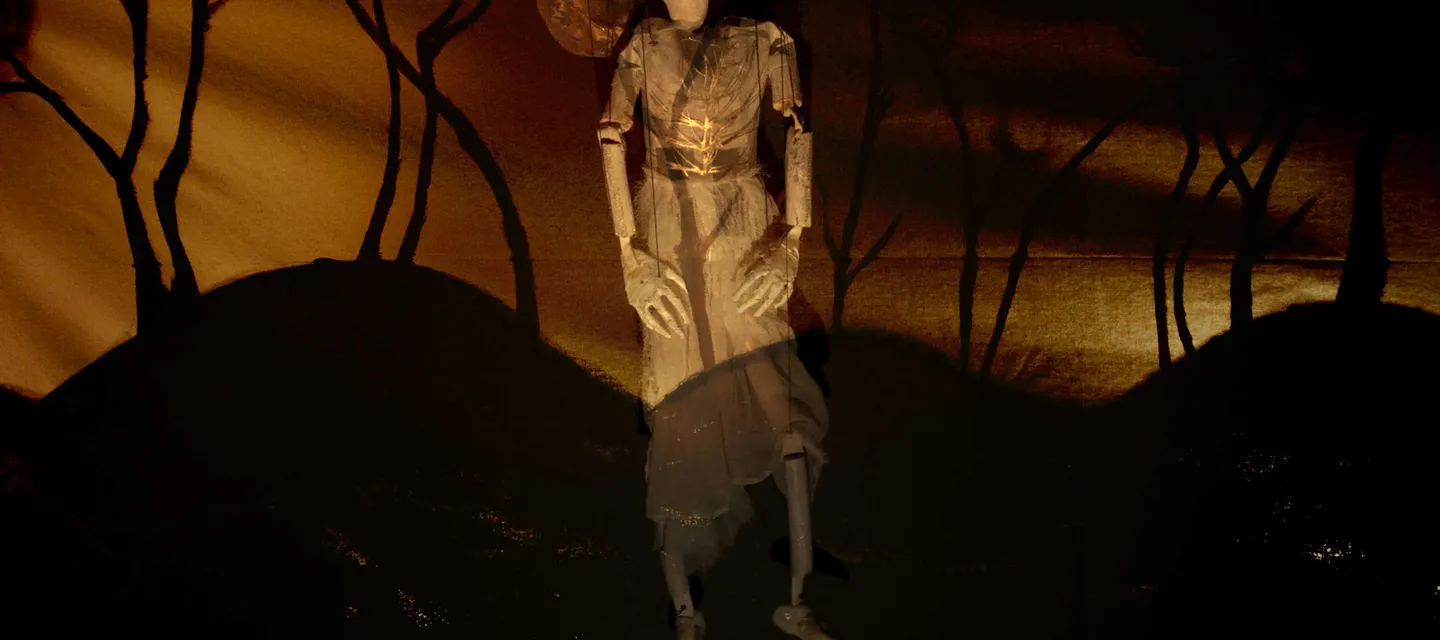




Dir: Ross Lipman | US Doc 71
Ventriloquism is explored in this novel and darkly amusing experimental doc hybrid from US documentarian Ross Lipman who traces the phenomenon of ‘throwing voices’ from the oracles of ancient Greece to the spectacle of the modern horror film.
It all starts with a strange one-eyed man who welcomes us into his abode referred to as the ‘psycho ward’ to experience the deepest corners of human mind. The story of puppetry and ventriloquism then unfolds through a consultation between two puppets: psychiatrist Dr Labyrinth and his patient Hugo, interleaved and enlivened by a comprehensive cache of film excerpts and archive footage from the famous ventriloquist stage double acts such as Anthony Hopkins, Karru Mari, Chucky providing a terrifying and comprehensive collage of creepiness that dates back to the 17th century and possibly even earlier.
‘Ventriloquism’ comes from Latin ‘to speak from the belly’ (the Greeks called it nacromancy). Noises from the stomach were thought to be the voices of God that were interpreted by the ventriloquist – forecasting future events
Essentially a two-hander (or a four-stringer) starring Hugo and Dr Labyrinth, the ‘case of the vanishing gods’ is what the puppet psychiatrist refers to as ‘Hugo’s case’. Hugo – a Bronx-accented classical marionette – is suffering from a fear of scissors and frequent memory loss. Dr Labyrinth puts Hugo under a trance where he experiences the most fantastic dream with sybilles or immortal nymphs becoming oracles and connecting us with the spirit world. Hugo then returns the following week for another session and once again is put into a trance, this time the Gods and Sybilles have disappeared and we learn how the 17th saw ventriloquism take shape as a more earthbound mode of communication. But it wasn’t until 1886 when Costa Joe introduced the first ventriloquist dummy to the theatre – Prof Echo brought his dummy Tommy who sang on stage with tunes like Sweet Rose O’Grady and soon the puppets were appearing in silent cinema: Lon Chaney provided the dummy’s voices himself. Then came Edgar Bergen and Charlie McCarthy.
All this unfolds through the medium of the patient and doctor consultations. Hugo’s memories then become darker and feature clips from the film Dead of Night (1945), Hugo somehow becoming a character friend of Michael Redgrave. Another memory has Hugo reflecting over the comedy duo where a dummy called Caesar actually takes over his ventriloquist, the dynamic dramatically switching and putting servant in control of master.
The third segment develops this sinister strand – the focus is now on puppets taking control of their owners – a worrying trend that has actually come full circle, hinting at the AI robots that are now with us in the 21st century. Meanwhile the Doc takes Hugo into his fourth session which encounters yet another memory featuring a Roubinska puppet who could see things the puppet ventriloquist could not express (“It’s schitzo Doc “).
The film touches on ‘Prophetic transition’ where the puppets become an alter ego helping us to bounce off our ideas and seek guidance for a higher unconscious and possibly unlocking the deep and potent inner resources of the human mind. The imagined puppet sequences in the first act are absolutely enchanting, delicately superimposed on Hugo’s first therapy session with the Doc. What follows is a compact yet immersive odyssey through the history of ventriloquism packing a richly thematic punch in just over a hour. And while the experimental style may not have wide appeal, content-wise Lipman offers an enjoyable dive into the history of this arcane form of entertainment. MT
ON FESTIVALSCOPE PRO
